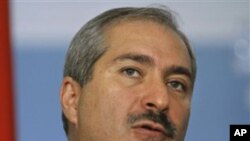Jordan’s Foreign Minister, Nasser Judeh, was in Washington on Monday to discuss regional issues - including the Mideast peace process - with U.S. officials. Speaking at a forum at the Brookings Institution, the foreign minister said there is a need for new tactics to overcome the impasse in the Middle East.
Foreign Minister Judeh said Jordan stands ready to support a renewed effort to find a solution in the Middle East peace process, but that the best way forward is the two state solution outlined in the Arab Peace Initiative.
The initiative, put forward by Saudi Arabia in 2002, calls for a two state solution based on the 1967 borders.
Speaking to a gathering of experts, officials and journalists, Judeh said there needs to be an effort to "operationalize" the initiative - to put forward concrete steps toward peace that might require new tactics.
"We’ve tried that approach and it didn’t work, and this approach and it didn’t work. And yet another approach that produced, you know, half a result. So what I am saying is let’s try something completely out of the box. In other words, instead of talking about parameters, let’s talk about a blueprint or a plan or a timeline or benchmarks. Let’s, for example, put a deadline over a discussion over borders rather than say ‘settlement freeze and you know up for grabs. We’ve had too much process and not enough peace," he said.
The minister said 2011 could be a vital year for a breakthrough in the peace process. Judeh said that U.S. President Barack Obama's call last year before the U.N. General Assembly for a Palestinian state to be a reality within a year puts welcome pressure on the parties to move toward peace.
But the foreign minister said that although third parties can act as mediators and push Palestinians and Israelis toward an agreement, ultimately only the two sides can make peace.
"It is not the United States that will bring about peace, it is not the Arab States. It is all of us together; it is the negotiating partners themselves who will reach a conclusion. The United States can present ideas. Jordan and Egypt are supporting this process and present their own ideas. The context of the Arab peace committee, the Arab foreign ministers, Europe. Everybody is presenting ideas. At the end of the day, it’s the parties themselves who will get to an agreement. And we all have to support whatever they arrive at," he said.
Foreign Minister Judeh also took the opportunity to address the recent release by Al Jazeera of documents showing that Palestinian authorities were prepared to make wide ranging concessions to the Israelis.
Judeh said he did not find those leaks shocking, but that he needed to review them in greater detail.
In addition to the Middle East peace process, Judeh touched on several other regional topics. He expressed optimism over developments in Iraq, saying that the government in Baghdad is moving forward independent of undue influence by Iran or Western interests.
But he said Jordan is deeply concerned by developments in Lebanon and hopes that the political turmoil there would not usher in a new period of violence.
Regarding any ripple effect following the upheaval in Tunisia, the foreign minister said economic difficulties have brought Jordanians out in protest, but he was quick to say that there is no real threat of a massive uprising on the streets of his country.
Jordanian Foreign Minister Visits Washington to Discuss Middle East Peace Process




